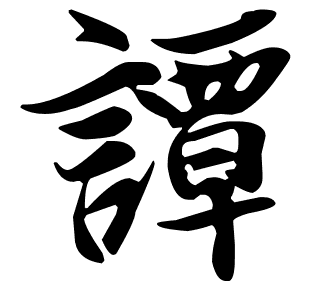Deng is an East Asian surname of Chinese origin which has many variant spellings and transliterations. It is a transcription of 邓 or 鄧 (traditional). In 2019, Deng was the 21st most common surname in mainland China.
Luo or Lo refers to the Mandarin romanizations of the Chinese surnames 羅 and 駱. Of the two surnames, wikt:罗 is much more common among Chinese people. According to the Cantonese pronunciation, it can also refer to 盧.
Mài is a Chinese surname. It is commonly transliterated as Mak in Hong Kong, based on the Cantonese pronunciation, though other transliterations exist. "麥" is the standard character in both Traditional and Simplified scripts but 麦 is also a variant seen in both. The meaning of the Chinese character is either wheat or barley. According to a 2013 study, 麦 was the 200th most common surname, shared by 550,000 people or 0.041% of China's population, with Guangdong being the province with the most.
He or Ho is the romanized transliteration of several Chinese family names. According to a 2012 survey, 14 million people had Hé listed as their surname, making it the 17th most common surname in Mainland China, a spot it retained in 2019. Hé was listed as the 21st most common surname in the Hundred Family Surnames. A common alternative spelling of the surname is Ho, which is the Mandarin Wade–Giles romanization and the Cantonese romanization of the Chinese family names.
Teng is a Chinese surname derived from State of Teng in the Western Zhou dynasty. It is the 73rd name on the Hundred Family Surnames poem. It is T'eng in Wade–Giles, Tàhng in Cantonese and is usually Romanized as "Tang" in Hong Kong. It is Têng in Hokkien and Teochew. It is "ddàng"in Wenzhou.
Liang is an East Asian surname of Chinese origin. The surname is often transliterated as Leung or Leong according to its Cantonese and Hakka pronunciation, Neo / Lio / Niu, or Liong (Fuzhou). In Indonesia, it is known as Liong or Nio. It is also common in Korea, where it is written Yang (양) or Ryang (량). In Vietnam, it is pronounced as Lương.

Tan is a common Chinese surname 譚, and is considered the 56th most common.
Lui is a surname in various cultures. It may be a variant spelling of two Chinese surnames, as well as an Italian surname. The surname Lui can also be found on various Pacific Islands.
Liao is a Chinese surname, most commonly found in Taiwan and Southern China. Statistics show it is among the 100 most common surnames in mainland China; figures from the Ministry of Public Security showed it to be the 61st most common surname, shared by around 4.2 million Chinese citizens.

Yao, also romanized as Yiu in Cantonese, is one of the most ancient Chinese surnames, the "Eight Great Xings of High Antiquity". It is also unique that, along with Jiang 姜 it is still in common use in the modern day. It is listed 101st in the Hundred Family Surnames, and as the 51st most common surname in Mainland China.

Zhong is pinyin transliteration of several Chinese surnames, including Zhōng (鍾/鐘/钟), and Zhòng (仲). These are also transliterated as Chung, Cheong or Choong, Tjung or Tjoeng, and Chiong. It is the 53rd most common surname in Mainland China.

Du (Chinese: 杜; pinyin: Dù; Wade–Giles: Tu4) is a Chinese surname. The name is spelled Tu in Taiwan. In Hong Kong it is spelled as To and in Macao as Tou, based on the pronunciation of 杜 in Cantonese. In Singapore and Malaysia, it is spelled as Toh, based on the pronunciation of 杜 in Hokkien. The Vietnamese equivalent of the surname is Đỗ. However, when diacritics are dropped, it can also be from the Vietnamese surnames Dư 余 or Dũ 俞 (for both, the Chinese equivalent is Yu). It is the 129th surname in Hundred Family Surnames and is the 42nd most common surname in Mainland China as of 2020.
Tang is a pinyin romanization of various Chinese surnames.
Hung is a non-pinyin romanisation of multiple Chinese surnames, based on different varieties of Chinese.

Tāng is a Chinese surname. It is 72nd surname in the Hundred Family Surnames or Baijiaxing of the Song dynasty and 101st in modern popularity. The Tang (湯) family name traces its lineage from Tang of Shang, the first ruler of the Shang dynasty. In modern times the character can also mean "soup" or "broth". In Cantonese the surname is pronounced Tong or Thong, and in Fujian, it is usually pronounced Theng or Teng.
Zhan is the pinyin romanization of several Chinese names, also spelled Chan in the Wade–Giles system common in Taiwan and in older publications
Lan is the Mandarin pinyin and Wade–Giles romanization of the Chinese surname written 蓝 in simplified Chinese and 藍 in traditional Chinese. It is romanized Lam or Nam in Cantonese.
Jiǎn is a Han surname meaning "bamboo slip" or "simple". It was the 382th surname listed on the Hundred Family Surnames. There are more people in Taiwan with this surname than any single province in Mainland China.
Miáo (苗) is a Chinese language surname. In 2013 it was counted as the 157th most common surname with 1 million people sharing the name or 0.075% of the total population, the province with the largest population of people with the name is Henan. It is the 53rd name on the Hundred Family Surnames poem.

Gǔ is a Chinese surname meaning 'old' or 'ancient'.





